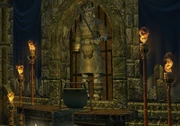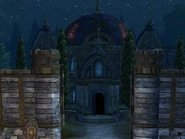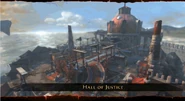The Hall of Justice was the temple of Tyr in the city of Neverwinter.[1]
Location[]
The Hall of Justice was located on a cliff overlooking the Sea of Swords on the south bank of the Neverwinter River near its mouth.[1][6] It was directly across the Sleeping Dragon Bridge from Castle Never.[7]
Before the Ruining of 1451 DR, the Hall of Justice was located in the City Core,[8] and after the rebuilding efforts of the late years of the 1470s DR decade, it was located in the Protector's Enclave.[1]
Structure[]
The gleaming, castle-like[9] church was built from stone, iron, and wood,[2] and was imposing[9] but beautiful to look upon.[10] It was a grand building that could comfortably accommodate giants and in its great hall, there was space enough for dragons to rest.[10]
Interior[]
The church was notable for its high ceilings,[9] but was mildly decorated, with several rooms for daily routines and worship.[2] The high priest had his own apartment in the temple.[10]
Activities[]
In 1368 DR, the Hall of Justice was presided over by Judge Oleff Uskar, ably assisted by Prior Hlam. Judge Uskar presided over the city's low justice—legal proceedings for citizens not of noble birth or accused of high crimes—while Hlam trained acolytes of Tyr in the meaning of justice and the martial arts.[7]
History[]
The Wailing Death[]

A statue of Tyr in Neverwinter's Hall of Justice.
During the Wailing Death of 1372 DR, the Hall was used as a base from which the search for the Waterdhavian creatures was launched as well as a sanatorium for plague victims. Judge Oleff also coordinated his search for the tomb of Halueth Never from the temple.[8]
Once Neverwinter had been rebuilt after the war with Luskan, the Hall of Justice was re-established. It was the place where prospective disciples of Tyr could join, if they met the requirements.[2]
The Kalach-Cha could have requested Khelgar Ironfist to become a monk. Hlam would ask Khelgar to find the reason for why he fought, to reconcile with those he had hurt. and to see all people equally. Once all these things had been completed, Khelgar could join as a monk.[2]
When the Kalach-Cha proved themself innocent at the court after being accused of killing the villagers of Ember, Torio asked for a trial by battle. The Kalach-Cha was asked to come to the Hall, where Hlam would take them to a room for meditation before the battle. During the time, the Kalach-Cha's companions could visit them.[2]
Post-Spellplague[]
When Tyr gave up his divinity to Torm, the residents of Neverwinter refused to rededicate the temple, and so the Tyrran faith remained strong in Neverwinter even after the death of the god himself.[1]
After the Ruining, the Hall of Justice was one of the few buildings left almost untouched by the cataclysm.[1]
When Dagult Neverember arrived in the city in 1469 DR,[11] he chose the Hall of Justice to be his seat of government. He took the high priest's apartments for his office and quarters[1] and conducted business in the audience chamber.[9] He also sponsored priests of Torm to worship in the building due to the similarity of their religious rituals to those of the old Tyrran ones.[1]
Around 1489 DR, when followers of Tyr went to Neverwinter to restore the temple of their god, Neverember gladly returned to them the Hall of Justice and moved into a private villa. This action made him even more worthy of a leader in the eyes of the Neverwintans.[3]
Trivia[]
After Dagult Neverember installed himself in the Hall of Justice, his detractors, specially the Nashers, began to call the temple "the Hall of Never-Justice".[10]
Appendix[]
Appearances[]
Gallery[]
References[]
- ↑ 1.00 1.01 1.02 1.03 1.04 1.05 1.06 1.07 1.08 1.09 1.10 Matt Sernett, Erik Scott de Bie, Ari Marmell (August 2011). Neverwinter Campaign Setting. Edited by Tanis O'Connor. (Wizards of the Coast), p. 140. ISBN 0-7869-5814-6.
- ↑ 2.0 2.1 2.2 2.3 2.4 2.5 Obsidian Entertainment (October 2006). Designed by Ferret Baudoin, J.E. Sawyer. Neverwinter Nights 2. Atari.
- ↑ 3.0 3.1 3.2 Steve Kenson, et al. (November 2015). Sword Coast Adventurer's Guide. Edited by Kim Mohan. (Wizards of the Coast), pp. 51–52. ISBN 978-0-7869-6580-9.
- ↑ Ed Greenwood, Julia Martin, Jeff Grubb (1993). Forgotten Realms Campaign Setting 2nd edition (revised), A Grand Tour of the Realms. (TSR, Inc), p. 114. ISBN 1-5607-6617-4.
- ↑ slade, et al. (April 1996). “Cities & Civilization”. In James Butler ed. The North: Guide to the Savage Frontier (TSR, Inc.), p. 14. ISBN 0-7869-0391-0.
- ↑ Map included in R.A. Salvatore (February 2013). Charon's Claw. (Wizards of the Coast). ISBN 0-7869-6362-X.
- ↑ 7.0 7.1 Ed Greenwood (1993). Volo's Guide to the North. (TSR, Inc), p. 133. ISBN 1-5607-6678-6.
- ↑ 8.0 8.1 BioWare (June 2002). Designed by Brent Knowles, James Ohlen. Neverwinter Nights. Atari.
- ↑ 9.0 9.1 9.2 9.3 Erik Scott de Bie (2011). Lost Crown of Neverwinter. (Wizards of the Coast), p. 22.
- ↑ 10.0 10.1 10.2 10.3 Matt Sernett, Erik Scott de Bie, Ari Marmell (August 2011). Neverwinter Campaign Setting. Edited by Tanis O'Connor. (Wizards of the Coast), p. 141. ISBN 0-7869-5814-6.
- ↑ Matt Sernett, Erik Scott de Bie, Ari Marmell (August 2011). Neverwinter Campaign Setting. Edited by Tanis O'Connor. (Wizards of the Coast), p. 90. ISBN 0-7869-5814-6.



